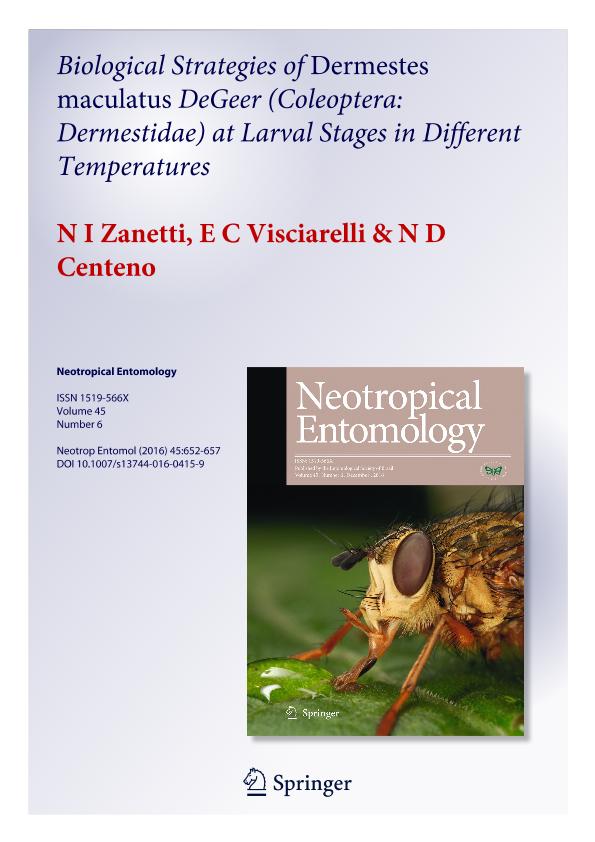Mostrar el registro sencillo del ítem
dc.contributor.author
Zanetti, Noelia Inés

dc.contributor.author
Visciarelli, Elena Concepcion

dc.contributor.author
Centeno, Néstor Daniel

dc.date.available
2023-05-03T11:13:22Z
dc.date.issued
2016-05
dc.identifier.citation
Zanetti, Noelia Inés; Visciarelli, Elena Concepcion; Centeno, Néstor Daniel; Biological strategies of Dermestes maculatus DeGeer (Coleoptera: Dermestidae) at larval stages in different temperatures; Sociedade Entomológica do Brasil; Neotropical Entomology; 45; 6; 5-2016; 652-657
dc.identifier.issn
1519-566X
dc.identifier.uri
http://hdl.handle.net/11336/196047
dc.description.abstract
The intraspecific variation in larval instars is a widely distributed phenomenon amongst holometabolous insects. Several factors can affect the number of instars, such as temperature, humidity, and density. Only a few references could be found in the literature because the invariability in the number of larval instars is considered normal, and the issue has raised little to no interest. Despite this, no study to date has intended to assess or focus on the larval development. Here, we analyzed the effect of different rearing temperature on the larval stage of Dermestes maculatus DeGeer (Coleoptera: Dermestidae). The results indicated that at all temperatures, L5 represented a decisive point for individuals as well as the other later larval instars, because the next step to follow was to pupate or molt to the next larval instar. Furthermore, there were mainly two populations, L5 and L6, although in different proportions according to temperature. We also found that at a greater number of instars, the larval development at all temperatures lasted longer. Moreover, the exponential model was the best adjustment in the developmental time of all populations as well as for the accumulated developmental time of L1–L4. Thus, we conclude that random factors such as genetics could probably cause interspecific variability in D. maculatus larval development.
dc.format
application/pdf
dc.language.iso
eng
dc.publisher
Sociedade Entomológica do Brasil

dc.rights
info:eu-repo/semantics/openAccess
dc.rights.uri
https://creativecommons.org/licenses/by-nc-sa/2.5/ar/
dc.subject
CADAVERIC FAUNA
dc.subject
DEVELOPMENT
dc.subject
HOLOMETABOLOUS INSECTS
dc.subject
LIFE CYCLE
dc.subject
SKIN BEETLES
dc.subject.classification
Zoología, Ornitología, Entomología, Etología

dc.subject.classification
Ciencias Biológicas

dc.subject.classification
CIENCIAS NATURALES Y EXACTAS

dc.title
Biological strategies of Dermestes maculatus DeGeer (Coleoptera: Dermestidae) at larval stages in different temperatures
dc.type
info:eu-repo/semantics/article
dc.type
info:ar-repo/semantics/artículo
dc.type
info:eu-repo/semantics/publishedVersion
dc.date.updated
2023-05-02T17:32:43Z
dc.identifier.eissn
1678-8052
dc.journal.volume
45
dc.journal.number
6
dc.journal.pagination
652-657
dc.journal.pais
Brasil

dc.description.fil
Fil: Zanetti, Noelia Inés. Universidad Nacional de Quilmes. Departamento de Ciencia y Tecnología. Laboratorio de Entomología Aplicada y Forense; Argentina. Universidad Nacional del Sur. Departamento de Biología, Bioquímica y Farmacia. Cátedra de Parasitología Clínica; Argentina. Consejo Nacional de Investigaciones Científicas y Técnicas; Argentina
dc.description.fil
Fil: Visciarelli, Elena Concepcion. Universidad Nacional del Sur. Departamento de Biología, Bioquímica y Farmacia. Cátedra de Parasitología Clínica; Argentina
dc.description.fil
Fil: Centeno, Néstor Daniel. Universidad Nacional de Quilmes. Departamento de Ciencia y Tecnología. Laboratorio de Entomología Aplicada y Forense; Argentina
dc.journal.title
Neotropical Entomology

dc.relation.alternativeid
info:eu-repo/semantics/altIdentifier/doi/http://dx.doi.org/10.1007/s13744-016-0415-9
Archivos asociados
